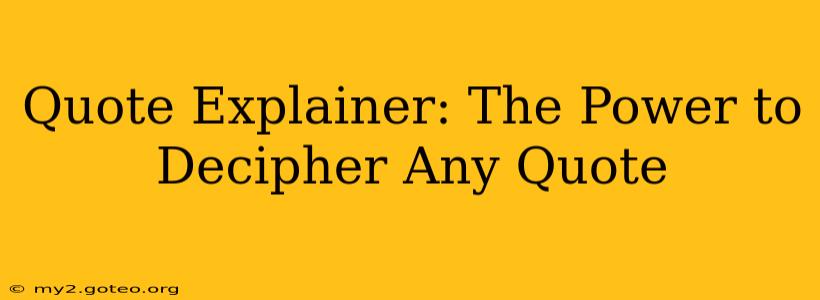Quotes—those pithy pronouncements, insightful observations, and memorable pronouncements—hold a unique power. They can inspire, challenge, and even change our perspectives. But understanding the true meaning behind a quote often requires more than a simple reading. This guide will equip you with the skills to decipher any quote, unlocking its hidden depths and appreciating its full impact.
What Makes a Quote Meaningful?
Before we dive into deciphering techniques, let's understand what makes a quote truly meaningful. A powerful quote goes beyond simple statements; it resonates on multiple levels. It often employs literary devices like metaphor, simile, and allusion to convey complex ideas concisely. Consider the impact of context—when and why the quote was uttered—as it significantly influences interpretation. Finally, a quote's lasting power often stems from its universality; it speaks to common human experiences and emotions that transcend time and culture.
How to Decipher Any Quote: A Step-by-Step Guide
Deciphering a quote is a process, not a single action. Here's a structured approach:
1. Understand the Context:
- Who said it? Knowing the speaker's background, beliefs, and experiences is crucial. Their authority and potential biases influence the quote's meaning.
- When was it said? Historical context matters. A quote from the 19th century might hold different weight than one from the 21st.
- Where was it said? The setting—a formal speech, a private conversation, a work of fiction—shapes the quote's intent and interpretation.
2. Analyze the Language:
- Identify key words and phrases. What are the most impactful words? What do they evoke? Are there any figures of speech being used?
- Look for patterns and repetitions. Repetition often emphasizes specific ideas or themes.
- Consider the tone and style. Is the quote sarcastic, humorous, serious, or passionate? This significantly impacts interpretation.
3. Research the References:
- Look up unfamiliar words or allusions. Quotes often reference historical events, literary works, or philosophical concepts. Researching these references enhances understanding.
- Seek additional information about the speaker and their work. Reading more from the author or speaker can provide crucial background.
4. Interpret the Meaning:
- Consider multiple interpretations. Quotes are rarely straightforward. Exploring different perspectives broadens your understanding.
- Relate the quote to your own experiences. Personal connection adds depth to comprehension.
- Consider the quote's broader implications. What message is the speaker trying to convey? How does this message resonate with current events or societal issues?
Frequently Asked Questions (FAQ)
Q: How can I tell if a quote is authentic?
A: Verifying the authenticity of a quote requires thorough research. Start by consulting reputable sources such as books, academic databases, and verified news articles. Cross-referencing information across multiple sources helps determine the quote's validity. Be wary of websites or social media posts that lack proper citation or attribution.
Q: What if I don't understand a word or phrase in a quote?
A: Don't be discouraged! Use a dictionary, thesaurus, or online resources to define unfamiliar terms. Context clues within the quote itself can also provide hints about the meaning of words or phrases.
Q: How can I use quote analysis in my own writing?
A: Analyzing quotes strengthens your critical thinking skills and allows you to incorporate compelling evidence into your work. You can use quote analysis to support your arguments, illustrate your points, and add depth to your writing.
Q: Are there different types of quotes, and how does that affect interpretation?
A: Yes, quotes can be categorized as inspirational, motivational, philosophical, literary, and more. The type of quote influences the approach to interpretation. For example, a philosophical quote demands a deeper exploration of underlying concepts than a simple motivational quote.
By following these steps and engaging in thoughtful analysis, you can unlock the profound power of quotes and enrich your understanding of language, literature, and the human experience. Remember, deciphering a quote is an active process of inquiry and interpretation – a journey of intellectual discovery.

